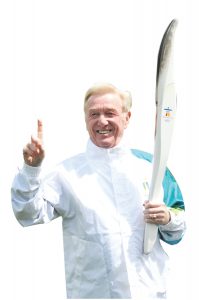
Olympic sprinter Stan Levenson
Melbourne, Australia 1956.
For 18-year-old Forest Hiller, Stan Levenson, the cavalcade into the Olympic stadium, rimming with 100,000 fans, made his heart race faster than his legs could carry him.
He was representing his country at the games as a sprinter. That memory never loses luster, much like the medals he strived for.
“Literally I almost passed out from fear,” he said of entering the stadium of the opening ceremonies. “It was a hell of an experience.
“You walk through this tunnel, you walk out into the stadium and all you see are thousands and thousands of people.”
He sits across a table, his eyes dampened by his recollections, as he shared his memories at the Town Crier office.
“Back in the ’50s track and field wasn’t a big thing as we know it today,” he said. “In ’56 Canada was just getting involved with the Olympics. Up till then we had some success and our big success came in 1928 when Percy Williams won the gold medal for Canada in 100-metres.”
Leading up to his Olympic appearance Levenson lived like a hermit, devoting his young life to nothing but running.
“My years in high school I gave up my social life because I was busy training six days a week,” he said. “It sounded corny in those days, but I couldn’t stay out to 10 or 11 o’clock at night go to parties, what have you.”
He was also the hot story for sports reporters like Milt Dunnell, but the print suitors who came calling didn’t impress everyone.
“This drove the high school nuts because Forest Hill Collegiate in the’50s and ’60s was strictly academic,” Levenson said. “All of a sudden this athlete comes along who couldn’t spell the word athletics.”
After making it to the Olympic semi-finals in the 100-metre dash, the same school he flustered decided to name a trophy given to the school’s top athlete after him in 1961.
“A couple of fathers got together, and I knew their sons really well, and they wanted a trophy named after me, called the Stan Levenson Athletic Award, which is given out to grade 13 students who graduates.
“The ironic part is I wasn’t the best student in the world, so I had to laugh. You have to have academic standing and athletics to get the award.”
With a fifth place finish at the Olympics and a scholarship to University of Houston, where he would break American sprinting legend Jesse Owens’ freshman record in 200-metres, Levenson gained celebrity status.
But when he got pleurisy in his junior year that all changed.
“They said I would never run again because my lungs were so badly damaged, so my scholarship was cancelled in 1959,” he said. “I was really heartbroken because my parents couldn’t afford to send me to school.”
But like any tenacious athlete he shook it off, and returned to the track at the 1960 Maccabiah Games in Israel.
“I came back to Canada in the early ’60s and I’m coming fifth and sixth, and people are looking, ‘Who is this kid, what a bum he’s become’, not knowing how sick I was,” he said. “A month before we went to Israel, everything started to click.”
Indeed, as he won the gold in the 100-metre dash.
But another tragedy put an end to his career.
“We used to run in the middle of the afternoon, it was a 100 degrees – hot as hell,” he recalled. “I was lying behind the stadium in the grass trying to keep cool and some guy was throwing a shot put and didn’t see me.
“It glanced right off my knee,” he added. “I ran the semi-final and collapsed.”
With a split meniscus, days spent training on the track would become a sepia-tone photograph tucked in his scrapbook.
But there is no discontent with Levenson.
“Truthfully I could never appreciate as I do today what it meant to be an Olympian,” he said.
